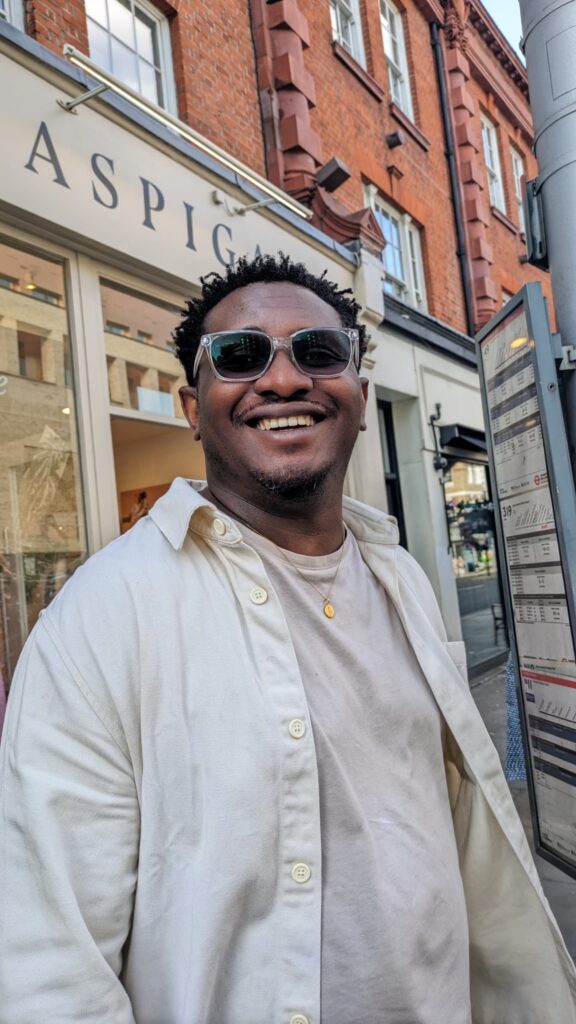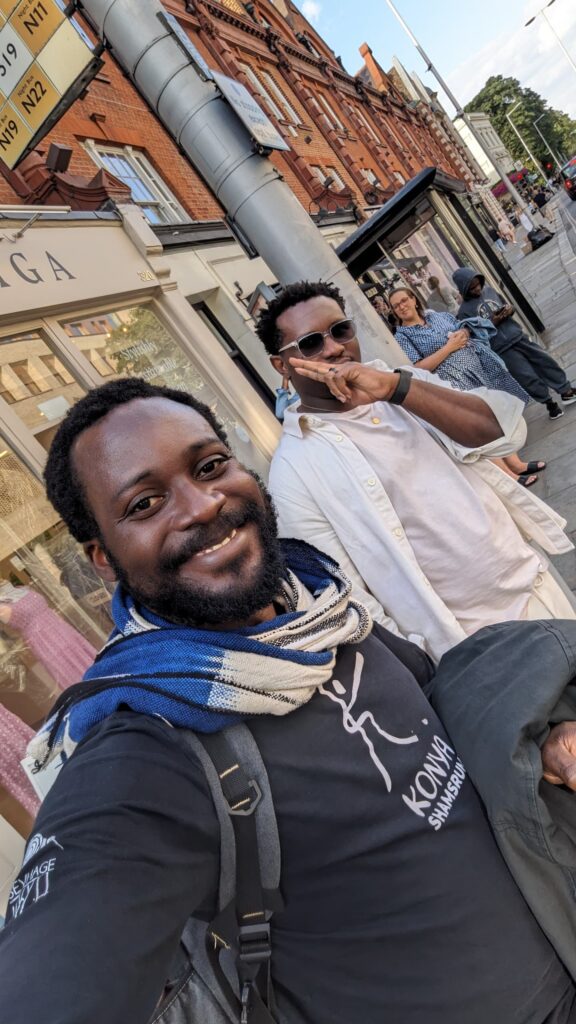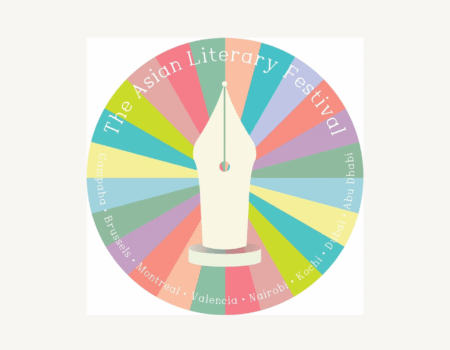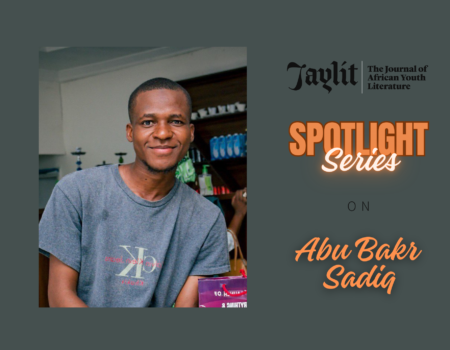The rule is simple: always use the Tube in London unless your next stop is just two hops away. If you ignore this, you’ll pay dearly—as I did when trying to make it to the lunch Frankie Chike Edozien had invited me to on a warm Saturday afternoon. I left my lodgings with a heavy knapsack and another bag filled with books I’d accumulated from a few days of celebrating Wole Soyinka at the Africa Centre and reconnecting with lovely people like Jahman Anikulapo, Sylvia Ofili, Leye Adenle, and Carmen McCain—but that’s a story for another day. As I strolled to the nearby Southwark Heritage Library, the late summer breeze carried the scent of blooming flowers and distant traffic, wrapping me in a sense of London’s history mingling with the present. The plan was to do a bit of work, attend Chike’s lunch for an hour, then catch a train to visit my friend, the author and publisher, Kukogho Iruesiri Samson.
It took all my willpower to leave the Southwark Heritage Library, an enchanting blend of old-world charm and modern innovation, where bookshelves lined with history stood beside cutting-edge exhibitions. I reluctantly headed to catch my bus and waited an eternity beyond the scheduled time before the right bus finally crawled by. It leisurely meandered through London’s traffic-jammed streets, until it stopped at Parliament, one stop short of its original destination. I dragged my tired self and my luggage to the next junction, and waited impatiently until the next bus arrived—and gosh, the longest journey of my life began anew. It reminded me of my reservations about Lagos, New York City, and other sprawling metropolises. I sent Chike a message saying I’d be late due to the traffic, and he wondered why I hadn’t taken the Tube. At that point, I asked myself the same question.
I must have dozed off a hundred times in the suffocating heat of that bus, as London’s temperature seemed to be competing with Accra, Ghana’s famed capital where last year, Chike—who is the Director of the New York University, Accra Campus and author of the famed Lives of Great Men—had hosted us at the NYU Labone Dialogue literary feast that featured Wole Soyinka, Chris Abani, Aminatta Forna, Abubakar Adam Ibrahim, Zukiswa Warner, Dami Ajayi, and so many other superstars. I marvelled that it had been a year since then. The current journey stretched on like it was going to take another year, but fortunately, it finally ended. I was a bit irritable.
I glanced at my watch and reassured myself, “An hour and a half, or two hours tops.” After all, Chike had agreed. I was a bit lost and wandered through the pretty Chelsea neighbourhood, marvelling at its manicured streets and the quiet elegance of the townhouses that echoed old money. I eventually found the entrance to the restaurant where we were meeting, a place that was quite Chelsean in its quiet poshness, and went upstairs where Chike said he would be.

As soon as I reached the beautifully appointed floor, I sighted Dami Ajayi and egbon Leye Adenle, the thrilling novelist and storyteller. My eyes asked the question, and their arched brows and wide, smiling mouths mirrored my emotion and confusion. Chike, with his signature warmth, hugged me and introduced me to the table; everyone stood up respectfully or acknowledged me with nods and smiles. Scott, whom I had last seen in Accra the previous year when we were invited by NYU, looked in great spirits and stood up to embrace me. The good Doctor was definitely in his element here and I was thrilled to see him looking awesome. Chike insisted I sit at the head of the table, but sitting beside Dami was the obvious better choice, which I took. We hadn’t seen each other since Accra, and I was eager to catch up with him. We chatted about many things, and I made it a point to urge him to revive Saraba Magazine and continue his Yaba-Left Literary Magazine. I understood his hesitation, given the amount of work it would entail to run these literary magazines alongside his full-time job as a psychiatrist in London. Saraba Magazine is one of those early literary magazines which Dami had founded with his then-literary partner, Emmanuel Iduma while they were in school at Ife. The magazine did a lot in its time and became a foundation on which many literary careers were built.
I was handed the menu and confusion became my name! The menu was an assortment of culinary possibilities, each dish described with a flair that made it difficult to choose. There was a full array of meals on the fancy menu, and I found it somewhat overwhelming, so I had to tell the waiter to give me a minute. The appetiser arrived at our table, and I watched as several people smiled in appreciation of what had been brought. It turned out to be duck salad with some biscuits and nuts, the duck tender and rich, paired with the crunch of fresh greens and the subtle sweetness of dried cranberries. It seemed intriguing, but I decided I would rather just have a main course. However, upon my host’s insistence, I settled for the same appetiser, without nuts. The dish was a delicate dance of flavours, the duck almost melting in my mouth, leaving a lingering savoury note that was both satisfying and light. It wasn’t a bad choice.
We were soon joined by an elderly lady who introduced herself as Wangui wa Goro, with whom I quickly struck up a conversation. We would intermittently leave our talk to turn to our neighbours, her to the gentleman on her left and me to Dami on my right. At some point, we were all talking together. Much later, we discovered she was Ngugi’s translator and a distinguished professor at the School of Oriental and African Studies (SOAS). We had long conversations, and Leye, with a mischievous glint in his eye, accused me of flirting. She laughed heartily and announced to us all that I was the age of her youngest child. She spoke about a project she was working on, translating the works of Ama Ata Aidoo and, if I remember correctly, Micere Mugo. Our discussion turned to the importance of forming meaningful connections to uplift ourselves as a people and as writers. We decided to ensure that the conversations did not end at that table.
After a while, Chike’s cousin joined us and sat beside Scott at the head of the table. We all stood for introductions, a formality that soon dissolved into more intimate exchanges as the table talks broke into clusters again, as they had at the beginning.
My host also helped me order the main course, which mirrored his: medium-done steak with chips. The steak arrived in its cliched beauty, a warm pink centre with lighter pink edges and a ring of grey around the outside. I took each bite and found it pleasing, almost like a song that might have burst my brain if I was much of a meat person. I thought of my wife, the meat person, and imagined how excited she would have been at this feast. The chips were golden and crisp, with a fluffy interior that absorbed just the right amount of seasoning.
After the meal, we had wine chosen by Leye, who is not only a compelling storyteller but also an experienced connoisseur of drinks, tastes, and traditions. The wine, a robust red with deep berry undertones, was the perfect complement to the meal, each sip bringing out new dimensions of the flavours we had just experienced. After washing it all down, dessert came, but I declined, like Dami. At some point, the hotel staff brought a small birthday cake for Scott, and we sang him a birthday song. The man was so shy, he covered his face and asked us to stop—but for a good man, the song never stops halfway. So, we sang some more, shared some merry cheer, and I said a prayer in his honour, in my heart.

I looked at my watch and saw that we had spent more than two hours. We said our goodbyes and shared hugs, the warmth of the gathering lingering like the aftertaste of a fine meal. Dami and I took a bus to Victoria Centre, chatting about a million and one things. The bus ride felt like a continuation of the feast, and we ensured we starved the silence in the cheer of our talk. I took a few pictures of him and us.
Finally, at Victoria, we went to the Tube and caught a train. I got off at some point to find my way to KIS’s place while Dami continued on, our day far from over.
S. Su’eddie Vershima Agema
Su’ur E. Su’eddie-Vershima Agema is a multiple-award-winning writer, editor, cultural advocate, and development practitioner. He heads SEVHAGE Publishing and its sister charity, SEVHAGE Literary and Development Initiative, while convening the annual Benue Book and Arts [International] Festival. He is the Managing Editor of the notable poetry collective, Konya Shamsrumi, and sits on the editorial team of Cons-cio Magazine. He also convenes and administers the SEVHAGE Literary Prizes, a collection of different prizes across the various genres. Su'eddie is a 2018 Chevening Scholar and a 2022 David C. Pollock Scholar.


![You are currently viewing [Featured Post] Travel Diary: A London Feast with Literary Stars](https://jaylit.com/wp-content/uploads/2024/09/PHOTO-2024-09-13-01-09-05-e1727098921366.jpg)


